阅读真题
- 格式:doc
- 大小:81.50 KB
- 文档页数:21
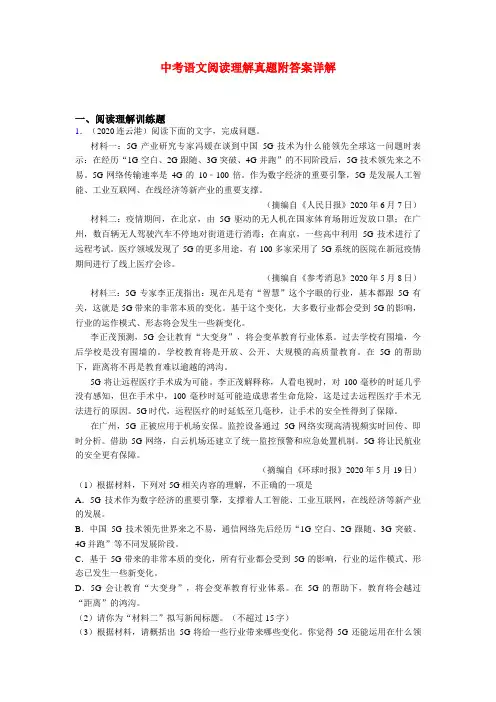
中考语文阅读理解真题附答案详解一、阅读理解训练题1.(2020连云港)阅读下面的文字,完成问题。
材料一:5G产业研究专家冯媛在谈到中国5G技术为什么能领先全球这一问题时表示:在经历“1G空白、2G跟随、3G突破、4G并跑”的不同阶段后,5G技术领先来之不易。
5G网络传输速率是4G的10﹣100倍。
作为数字经济的重要引擎,5G是发展人工智能、工业互联网、在线经济等新产业的重要支撑。
(摘编自《人民日报》2020年6月7日)材料二:疫情期间,在北京,由5G驱动的无人机在国家体育场附近发放口罩;在广州,数百辆无人驾驶汽车不停地对街道进行消毒;在南京,一些高中利用5G技术进行了远程考试。
医疗领域发现了5G的更多用途,有100多家采用了5G系统的医院在新冠疫情期间进行了线上医疗会诊。
(摘编自《参考消息》2020年5月8日)材料三:5G专家李正茂指出:现在凡是有“智慧”这个字眼的行业,基本都跟5G有关,这就是5G带来的非常本质的变化。
基于这个变化,大多数行业都会受到5G的影响,行业的运作模式、形态将会发生一些新变化。
李正茂预测,5G会让教育“大变身”,将会变革教育行业体系。
过去学校有围墙,今后学校是没有围墙的。
学校教育将是开放、公开、大规模的高质量教育。
在5G的帮助下,距离将不再是教育难以逾越的鸿沟。
5G将让远程医疗手术成为可能。
李正茂解释称,人看电视时,对100毫秒的时延几乎没有感知,但在手术中,100毫秒时延可能造成患者生命危险,这是过去远程医疗手术无法进行的原因。
5G时代,远程医疗的时延低至几毫秒,让手术的安全性得到了保障。
在广州,5G正被应用于机场安保。
监控设备通过5G网络实现高清视频实时回传、即时分析。
借助5G网络,白云机场还建立了统一监控预警和应急处置机制。
5G将让民航业的安全更有保障。
(摘编自《环球时报》2020年5月19日)(1)根据材料,下列对5G相关内容的理解,不正确的一项是A.5G技术作为数字经济的重要引擎,支撑着人工智能、工业互联网,在线经济等新产业的发展。
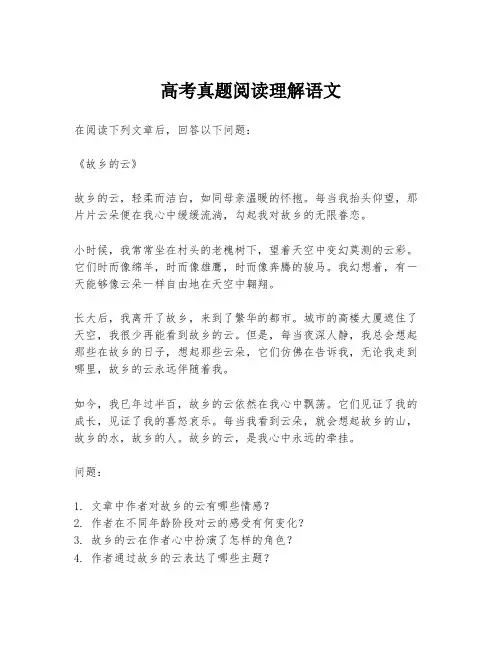
高考真题阅读理解语文
在阅读下列文章后,回答以下问题:
《故乡的云》
故乡的云,轻柔而洁白,如同母亲温暖的怀抱。
每当我抬头仰望,那片片云朵便在我心中缓缓流淌,勾起我对故乡的无限眷恋。
小时候,我常常坐在村头的老槐树下,望着天空中变幻莫测的云彩。
它们时而像绵羊,时而像雄鹰,时而像奔腾的骏马。
我幻想着,有一天能够像云朵一样自由地在天空中翱翔。
长大后,我离开了故乡,来到了繁华的都市。
城市的高楼大厦遮住了天空,我很少再能看到故乡的云。
但是,每当夜深人静,我总会想起那些在故乡的日子,想起那些云朵,它们仿佛在告诉我,无论我走到哪里,故乡的云永远伴随着我。
如今,我已年过半百,故乡的云依然在我心中飘荡。
它们见证了我的成长,见证了我的喜怒哀乐。
每当我看到云朵,就会想起故乡的山,故乡的水,故乡的人。
故乡的云,是我心中永远的牵挂。
问题:
1. 文章中作者对故乡的云有哪些情感?
2. 作者在不同年龄阶段对云的感受有何变化?
3. 故乡的云在作者心中扮演了怎样的角色?
4. 作者通过故乡的云表达了哪些主题?
请根据文章内容,结合自己的理解,回答上述问题。
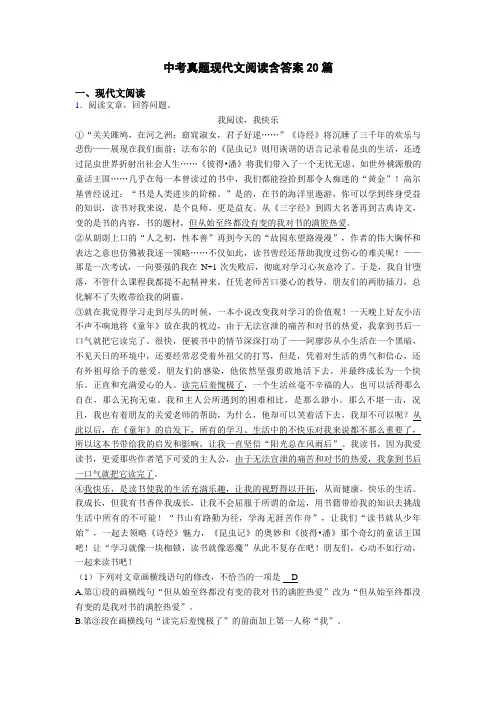
中考真题现代文阅读含答案20篇一、现代文阅读1.阅读文章,回答问题。
我阅读,我快乐①“关关雎鸠,在河之洲;窈窕淑女,君子好逑……”《诗经》将沉睡了三千年的欢乐与悲伤——展现在我们面前;法布尔的《昆虫记》则用诙谐的语言记录着昆虫的生活,还透过昆虫世界折射出社会人生……《彼得•潘》将我们带入了一个无忧无虑、如世外桃源般的童话王国……几乎在每一本曾读过的书中,我们都能捡拾到那令人痴迷的“黄金”!高尔基曾经说过:“书是人类进步的阶梯。
”是的,在书的海洋里遨游,你可以学到终身受益的知识,读书对我来说,是个良师,更是益友。
从《三字经》到四大名著再到古典诗文,变的是书的内容,书的题材,但从始至终都没有变的我对书的满腔热爱。
②从朗朗上口的“人之初,性本善”再到今天的“故园东望路漫漫”,作者的伟大胸怀和表达之意也仿佛被我逐一领略……不仅如此,读书曾经还帮助我度过伤心的难关呢!——那是一次考试,一向要强的我在N+1次失败后,彻底对学习心灰意冷了。
于是,我自甘堕落,不管什么课程我都提不起精神来,任凭老师苦口婆心的教导,朋友们的两肋插刀,总化解不了失败带给我的阴霾。
③就在我觉得学习走到尽头的时候,一本小说改变我对学习的价值观!一天晚上好友小洁不声不响地将《童年》放在我的枕边,由于无法宣泄的痛苦和对书的热爱,我拿到书后一口气就把它读完了。
很快,便被书中的情节深深打动了——阿廖莎从小生活在一个黑暗,不见天日的环境中,还要经常忍受着外祖父的打骂,但是,凭着对生活的勇气和信心,还有外祖母给予的慈爱。
朋友们的感染,他依然坚强勇敢地活下去,并最终成长为一个快乐。
正直和充满爱心的人。
读完后羞愧极了,一个生活丝毫不辛福的人,也可以活得那么自在,那么无拘无束。
我和主人公所遇到的困难相比,是那么渺小。
那么不堪一击,况且,我也有着朋友的关爱老师的帮助,为什么,他却可以笑着活下去,我却不可以呢?从此以后,在《童年》的启发下,所有的学习、生活中的不快乐对我来说都不那么重要了,所以这本书带给我的启发和影响,让我一直坚信“阳光总在风雨后”。
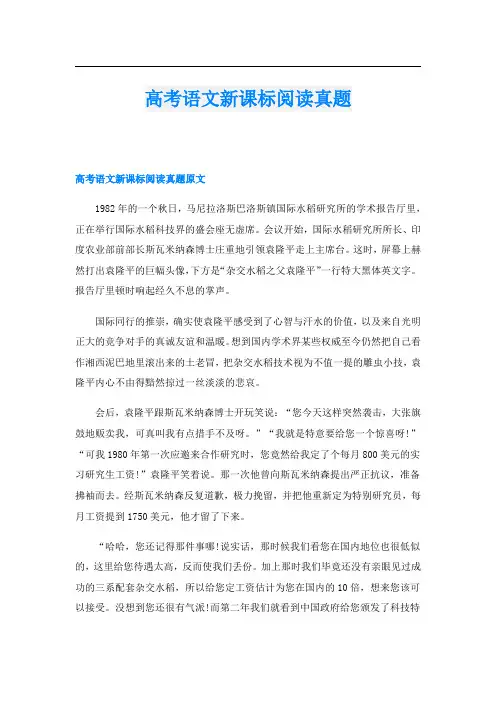
高考语文新课标阅读真题高考语文新课标阅读真题原文1982年的一个秋日,马尼拉洛斯巴洛斯镇国际水稻研究所的学术报告厅里,正在举行国际水稻科技界的盛会座无虚席。
会议开始,国际水稻研究所所长、印度农业部前部长斯瓦米纳森博士庄重地引领袁隆平走上主席台。
这时,屏幕上赫然打出袁隆平的巨幅头像,下方是“杂交水稻之父袁隆平”一行特大黑体英文字。
报告厅里顿时响起经久不息的掌声。
国际同行的推崇,确实使袁隆平感受到了心智与汗水的价值,以及来自光明正大的竞争对手的真诚友谊和温暖。
想到国内学术界某些权威至今仍然把自己看作湘西泥巴地里滚出来的土老冒,把杂交水稻技术视为不值一提的雕虫小技,袁隆平内心不由得黯然掠过一丝淡淡的悲哀。
会后,袁隆平跟斯瓦米纳森博士开玩笑说:“您今天这样突然袭击,大张旗鼓地贩卖我,可真叫我有点措手不及呀。
”“我就是特意要给您一个惊喜呀!”“可我1980年第一次应邀来合作研究时,您竟然给我定了个每月800美元的实习研究生工资!”袁隆平笑着说。
那一次他曾向斯瓦米纳森提出严正抗议,准备拂袖而去。
经斯瓦米纳森反复道歉,极力挽留,并把他重新定为特别研究员,每月工资提到1750美元,他才留了下来。
“哈哈,您还记得那件事哪!说实话,那时候我们看您在国内地位也很低似的,这里给您待遇太高,反而使我们丢份。
加上那时我们毕竟还没有亲眼见过成功的三系配套杂交水稻,所以给您定工资估计为您在国内的10倍,想来您该可以接受。
没想到您还很有气派!而第二年我们就看到中国政府给您颁发了科技特等发明奖,而且您的伟大成果也让我们亲眼看到了。
所以我们后来一直为那件事感到惭愧。
今天,也算是我们正式为您正名吧!”“哈哈,原来阁下您也曾亲自参与歧视我的勾当啊!坦率地说,我们在国内是从来不争经济利益的。
可是,到了您这里,拿多少钱可就关系到中国科学家的尊严了,所以我一定要跟您斗争到底啊。
不过,中国有句老话,叫做不打不相识。
这就像我们国际科技界的朋友们,实际都是同一阵地上的竞争对手。
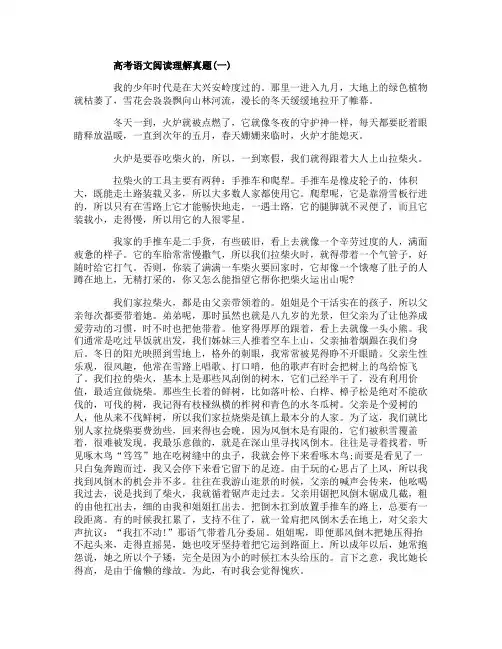
高考语文阅读理解真题(一)我的少年时代是在大兴安岭度过的。
那里一进入九月,大地上的绿色植物就枯萎了,雪花会袅袅飘向山林河流,漫长的冬天缓缓地拉开了帷幕。
冬天一到,火炉就被点燃了,它就像冬夜的守护神一样,每天都要眨着眼睛释放温暖,一直到次年的五月,春天姗姗来临时,火炉才能熄灭。
火炉是要吞吃柴火的,所以,一到寒假,我们就得跟着大人上山拉柴火。
拉柴火的工具主要有两种:手推车和爬犁。
手推车是橡皮轮子的,体积大,既能走土路装载又多,所以大多数人家都使用它。
爬犁呢,它是靠滑雪板行进的,所以只有在雪路上它才能畅快地走,一遇土路,它的腿脚就不灵便了,而且它装载小,走得慢,所以用它的人很零星。
我家的手推车是二手货,有些破旧,看上去就像一个辛劳过度的人,满面疲惫的样子。
它的车胎常常慢撒气,所以我们拉柴火时,就得带着一个气管子,好随时给它打气。
否则,你装了满满一车柴火要回家时,它却像一个饿瘪了肚子的人蹲在地上,无精打采的,你又怎么能指望它帮你把柴火运出山呢?我们家拉柴火,都是由父亲带领着的。
姐姐是个干活实在的孩子,所以父亲每次都要带着她。
弟弟呢,那时虽然也就是八九岁的光景,但父亲为了让他养成爱劳动的习惯,时不时也把他带着。
他穿得厚厚的跟着,看上去就像一头小熊。
我们通常是吃过早饭就出发,我们姊妹三人推着空车上山,父亲抽着烟跟在我们身后。
冬日的阳光映照到雪地上,格外的刺眼,我常常被晃得睁不开眼睛。
父亲生性乐观,很风趣,他常在雪路上唱歌、打口哨,他的歌声有时会把树上的鸟给惊飞了。
我们拉的柴火,基本上是那些风刮倒的树木,它们已经半干了,没有利用价值,最适宜做烧柴。
那些生长着的鲜树,比如落叶松、白桦、樟子松是绝对不能砍伐的,可伐的树,我记得有枝桠纵横的柞树和青色的水冬瓜树。
父亲是个爱树的人,他从来不伐鲜树,所以我们家拉烧柴是镇上最本分的人家。
为了这,我们就比别人家拉烧柴要费劲些,回来得也会晚。
因为风倒木是有限的,它们被积雪覆盖着,很难被发现。
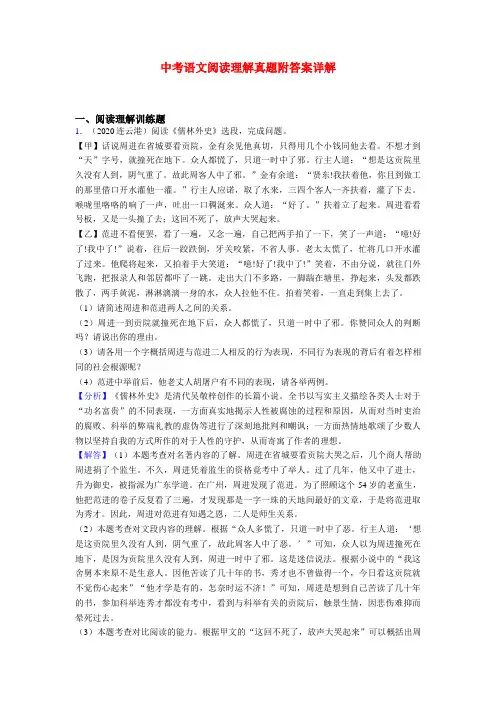
中考语文阅读理解真题附答案详解一、阅读理解训练题1.(2020连云港)阅读《儒林外史》选段,完成问题。
【甲】话说周进在省城要看贡院,金有余见他真切,只得用几个小钱同他去看。
不想才到“天”字号,就撞死在地下。
众人都慌了,只道一时中了邪。
行主人道:“想是这贡院里久没有人到,阴气重了。
故此周客人中了邪。
”金有余道:“贤东!我扶着他,你且到做工的那里借口开水灌他一灌。
”行主人应诺,取了水来,三四个客人一齐扶着,灌了下去。
喉咙里咯咯的响了一声,吐出一口稠涎来。
众人道:“好了。
”扶着立了起来。
周进看看号板,又是一头撞了去;这回不死了,放声大哭起来。
【乙】范进不看便罢,看了一遍,又念一遍,自己把两手拍了一下,笑了一声道:“噫!好了!我中了!”说着,往后一跤跌倒,牙关咬紧,不省人事。
老太太慌了,忙将几口开水灌了过来。
他爬将起来,又拍着手大笑道:“噫!好了!我中了!”笑着,不由分说,就往门外飞跑,把报录人和邻居都吓了一跳。
走出大门不多路,一脚踹在塘里,挣起来,头发都跌散了,两手黄泥,淋淋漓漓一身的水,众人拉他不住。
拍着笑着,一直走到集上去了。
(1)请简述周进和范进两人之间的关系。
(2)周进一到贡院就撞死在地下后,众人都慌了,只道一时中了邪。
你赞同众人的判断吗?请说出你的理由。
(3)请各用一个字概括周进与范进二人相反的行为表现,不同行为表现的背后有着怎样相同的社会根源呢?(4)范进中举前后,他老丈人胡屠户有不同的表现,请各举两例。
【分析】《儒林外史》是清代吴敬梓创作的长篇小说。
全书以写实主义描绘各类人士对于“功名富贵”的不同表现,一方面真实地揭示人性被腐蚀的过程和原因,从而对当时吏治的腐败、科举的弊端礼教的虚伪等进行了深刻地批判和嘲讽;一方面热情地歌颂了少数人物以坚持自我的方式所作的对于人性的守护,从而寄寓了作者的理想。
【解答】(1)本题考查对名著内容的了解。
周进在省城要看贡院大哭之后,几个商人帮助周进捐了个监生。
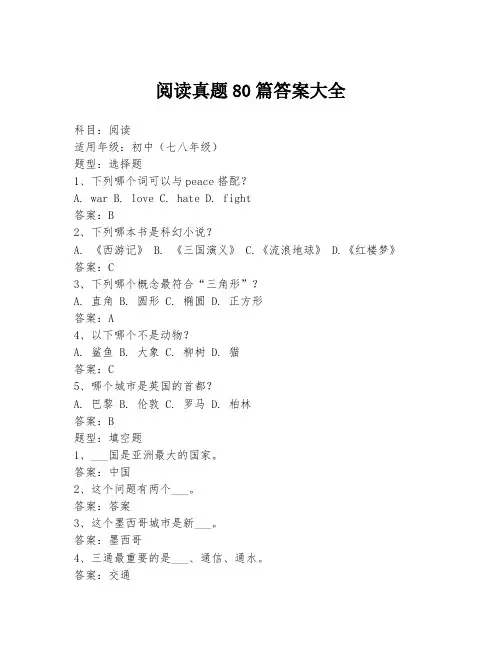
阅读真题80篇答案大全科目:阅读适用年级:初中(七八年级)题型:选择题1、下列哪个词可以与peace搭配?A. warB. loveC. hateD. fight答案:B2、下列哪本书是科幻小说?A. 《西游记》B. 《三国演义》C.《流浪地球》D.《红楼梦》答案:C3、下列哪个概念最符合“三角形”?A. 直角B. 圆形C. 椭圆D. 正方形答案:A4、以下哪个不是动物?A. 鲨鱼B. 大象C. 柳树D. 猫答案:C5、哪个城市是英国的首都?A. 巴黎B. 伦敦C. 罗马D. 柏林答案:B题型:填空题1、___国是亚洲最大的国家。
答案:中国2、这个问题有两个___。
答案:答案3、这个墨西哥城市是新___。
答案:墨西哥4、三通最重要的是___、通信、通水。
答案:交通5、我肚子饿了,我想吃___。
答案:面包题型:判断题1、地球是平的。
答案:错2、人类最聪明的动物是鲸鱼。
答案:错3、太阳从西边升起,从东边落下。
答案:错4、小明是个女孩。
答案:错5、李白是唐朝的诗人。
答案:对题型:简答题1、请简要介绍一下《红楼梦》的主要人物。
答案:《红楼梦》的主要人物有贾宝玉、林黛玉、薛宝钗等。
2、请简要介绍一下地球自转的概念。
答案:地球自转是指地球绕自己的轴心转动,每转一周称为一日。
3、请简要介绍一下三角形的性质。
答案:三角形有三条边和三个角,角的和为180度。
常见的三角形有直角三角形和等边三角形。
4、请简要介绍一下中国的世界文化遗产。
答案:中国的世界文化遗产有故宫、长城、秦始皇陵兵马俑、颐和园等。
5、请简要介绍一下水的三态。
答案:水有三态,即固态、液态、气态。
固态下为冰,液态下为水,气态下为水蒸气。
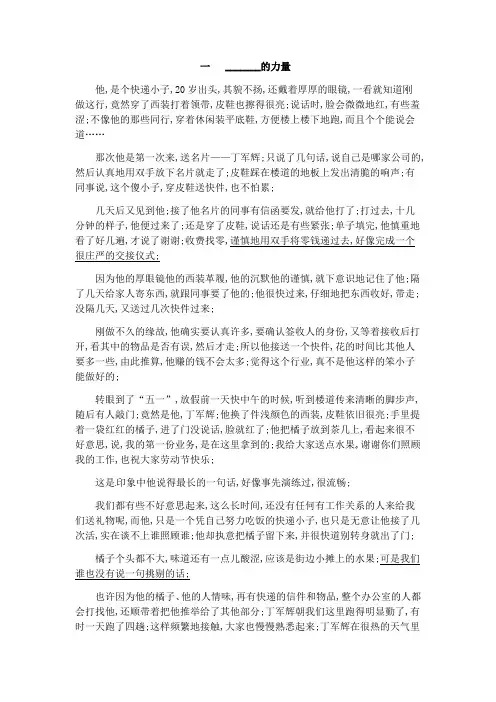
一 _______的力量他,是个快递小子,20岁出头,其貌不扬,还戴着厚厚的眼镜,一看就知道刚做这行,竟然穿了西装打着领带,皮鞋也擦得很亮;说话时,脸会微微地红,有些羞涩;不像他的那些同行,穿着休闲装平底鞋,方便楼上楼下地跑,而且个个能说会道……那次他是第一次来,送名片——丁军辉;只说了几句话,说自己是哪家公司的,然后认真地用双手放下名片就走了;皮鞋踩在楼道的地板上发出清脆的响声;有同事说,这个傻小子,穿皮鞋送快件,也不怕累;几天后又见到他;接了他名片的同事有信函要发,就给他打了;打过去,十几分钟的样子,他便过来了;还是穿了皮鞋,说话还是有些紧张;单子填完,他慎重地看了好几遍,才说了谢谢;收费找零,谨慎地用双手将零钱递过去,好像完成一个很庄严的交接仪式;因为他的厚眼镜他的西装革履,他的沉默他的谨慎,就下意识地记住了他;隔了几天给家人寄东西,就跟同事要了他的;他很快过来,仔细地把东西收好,带走;没隔几天,又送过几次快件过来;刚做不久的缘故,他确实要认真许多,要确认签收人的身份,又等着接收后打开,看其中的物品是否有误,然后才走;所以他接送一个快件,花的时间比其他人要多一些,由此推算,他赚的钱不会太多;觉得这个行业,真不是他这样的笨小子能做好的;转眼到了“五一”,放假前一天快中午的时候,听到楼道传来清晰的脚步声,随后有人敲门;竟然是他,丁军辉;他换了件浅颜色的西装,皮鞋依旧很亮;手里提着一袋红红的橘子,进了门没说话,脸就红了;他把橘子放到茶几上,看起来很不好意思,说,我的第一份业务,是在这里拿到的;我给大家送点水果,谢谢你们照顾我的工作,也祝大家劳动节快乐;这是印象中他说得最长的一句话,好像事先演练过,很流畅;我们都有些不好意思起来,这么长时间,还没有任何有工作关系的人来给我们送礼物呢,而他,只是一个凭自己努力吃饭的快递小子,也只是无意让他接了几次活,实在谈不上谁照顾谁;他却执意把橘子留下来,并很快道别转身就出了门;橘子个头都不大,味道还有一点儿酸涩,应该是街边小摊上的水果;可是我们谁也没有说一句挑剔的话;也许因为他的橘子、他的人情味,再有快递的信件和物品,整个办公室的人都会打找他,还顺带着把他推举给了其他部分;丁军辉朝我们这里跑得明显勤了,有时一天跑了四趟;这样频繁地接触,大家也慢慢熟悉起来;丁军辉在很热的天气里也要穿着衬衣,大多是白色的,领口扣得很整齐;始终穿皮鞋,从来都不随意;有次同事跟他开玩笑说,你老穿这么规则,一点不像送快递的,倒像卖保险的;他却认真地说,卖保险都穿那么认真,送快递的怎么就不能这是对对方最起码的尊重,也是对我们职业的尊重;我们都笑,这么简单的工作,他做得比别人辛苦多了,可这样的辛苦,最后能得到什么呢我们的态度并不乐观,觉得他这么笨的人,想发展不太轻易;果然,丁军辉的快递生涯一干就是两年;两年里他除去换了一副眼镜,衣着和言行基本上没有变化;工作态度依旧认真,从来没听到他有什么抱怨;那天我打让他来取东西;我的大学同学在一所中专学校任教,“十一”结婚,我有礼物送她;填完单子,丁军辉核查时冷不丁地说,啊,是我念书的学校;他的声音很大,把我吓了一跳;他又说,我是在那里毕业的;这次我听明白了,不由抬起头来,有些吃惊地看着他;你也在那里上过学吗可能那个地址让他有些兴奋,一连串地说,是啊是啊,我是学财会的,2012年刚毕业;天这个其貌不扬的快递小子,竟然是个正规学校的中专生;我忍不住问他,你有学历也有专业特长,做个快递员,你当初学的知识不都浪费了我不禁替他惋惜;不会啊,送快递也需要有好的统筹才会提高效率,比如把客户跟据不同的地域、不同的业务类型明细分类,业务多的客户一般送什么,送到哪里,私人的如何送……通常看到客户,就知道他的具体位置,大概送什么,需要带多大的箱子……他嘻嘻地笑,知识哪有白学的我真对他有些另眼相看了,没想到笨笨的他这么有心,而他的话,也真有着深入的情理;转眼又到了“五一”,节前总会有往来的物品,那天给丁军辉打来取东西,是他接的,来的却是另外一个更年轻的男孩;说,我是快递公司的,丁主管要我来拿东西;我愣了一下,转念明白过来;说,丁军辉当主管了是啊;男孩说,年底就去南宁当分公司的经理了,都宣布了;不等我们问,他接着又说,上次公司会议上宣布的,提升的理由好几条呢:他是公司唯一干得最长的快递员,是唯一有学历的快递员,是唯一保持穿西装的快递员,是唯一建立客户档案的快递员,是唯一没有接到客户投诉的快递员……因为丁军辉的事,那天,我心里感到由衷的高兴;当天下午,丁军辉的快递公司送来同城快件,是一箱进口的橙子;虽然没有卡片没有留言,我们都知道是他送的;隔着这些漂亮的橙子,我却看到了那些小小的橘子;橙子很大,色泽鲜艳,味道甜美;它们,不就是那些小橘子开出的花吗文章略有删改13.速读选文,概括主要情节;送名片→①→赠送橘子→谈衣着→②→③→赠送橙子14.选取最恰当的词语,将题目补充完整;A.乐观 B.认真 C.勤奋 D.谨慎15.文章多次出现了丁军辉“穿西装打领带穿皮鞋”的细节描写,试分析其作用;16.下列表述不恰当的一项是A.第3自然段“谨慎地用双手将零钱递过去,好像完成一个很庄严的交接仪式”一句,“谨慎、庄重”等词语的运用,表现了丁军辉的拘谨;B.第9自然段“可是我们谁也没有说一句挑剔的话”,是因为大家被丁军辉的人情味打动了,对他有了一些理解、亲近和包容;C.第22自然段快递小伙子的话,补充介绍了丁军辉的业绩,使其形象更加丰满动人;D.文章开头写丁军辉是不被大家看好的“傻小子”“笨小子”,到后来“我”对他另眼相看、为他由衷高兴,这种情感的变化,使文章波澜起伏,吸引读者;17.试理解第24自然段划线句子的含义;二现代文阅读 13分13.①收送快件②谈学历③谈升迁升主管评分:3分;每空1分,大意对即可14.B 2 分15.参考答案:文章多次出现丁军辉“穿西装打领带穿皮鞋”的细节描写,表现了丁军辉对客户、对职业的尊重态度,突出了他严谨、认真的性格特点;评分:2分;大意对即可i6.A 3 分17.参考答案:小人物丁军辉凭借自己的认真和执着,最终取得了成功,评分:3分;大意对即可二枯萎的蒲公英叶子①冬日的午后,阳光虽也明亮,但触一触还是有着沁骨的凉;冬以它的冷漠,裹挟尽百花的艳影,留一地斑驳的枯黄;我不由得竖起大衣的领子;蓦地,一棵蒲公英,出现在我的视野里;②那是一株怎样的蒲公英叶子的边缘已露出萎黄的老态,但还是透着铁一般的绿;叶们努力地贴向地面,那是一种力量爆发前,手脚触地的姿势;也是呢,霜一次又一次的从天而降,树叶渐渐飞去,草茎慢慢垂下头来;生命的“红灯”,已经在不远处,正一点点逼近自己,那就用尽全部的力,贴向地面,贴向地面……这就是蒲公英最聪明、最刚强也最负责任的举动;他们明白,要想延续久远,就不能把头昂得太高这样才能把最沉实的爱,尽可能多地传递给儿女;③我的心不由得疼.了一下,这像极了我的母亲;④去年的这个时节,冬阳阻不住东奔西跑的北风,正如我阻不住我八十岁老母的脚;她在楼下,为我寻挖着蒲公英;“经霜的婆婆丁蒲公英的俗号能消炎败火,你这嗓子,应该吃点;”⑤她半弓着腰,在衰草连片的枯黄里,神情专注地寻找那一小簇一小簇的绿;她时不时地弓腰,用那曾经丰腴饱满而至今肉皮松弛的手,极其小心地翻检着枯黄的草,似乎蒲公英长着脚,一不小心,受了惊吓,就会跑掉了似的;母亲的脚步,已失去了早年的利落,有些蹒跚;那是一双怎样的脚啊为了让孩子们正常地进入学校,她携夫带子,脚板直探向千里外陌生的异乡;为了一家老小能吃上饭,她不分白天和夜晚,不惧严寒和冰霜,用那细小的绣花针,绣出蟒袍上那呼之欲出的龙的模样,再用一双脚板,驱北风,走冰路,登火车,为一家换回不很丰裕的口粮;⑥风,不时掀起母亲的白发,就像掀动一团绒绒的、洁白的蒲公英的种子;它是想探寻那丝丝缕缕里,藏着多少生活的艰辛那就去问问太阳和月亮,几十年晨昏的默默相伴,它们如何把一个面如花,发如墨的纤纤女子,伴成了眼已花、头覆雪的颤颤老妪探询那长长短短里,浸着多少爱意的疲累那就去问问星辰,千千万万次的斗转星移,如何刻录下一个个儿女渐渐长大的足迹,还有母亲的血泪和汗滴;⑦渐次地,她的儿女乘着她那用善良、勤苦织成的爱的伞,找到自己生根发芽的一片片土地;她的脚,不怎么好用了——移动缓慢,脚步蹒跚,但她的心,还是不断地牵挂,就像那天,风在楼下,母亲在楼下;⑧如今,母亲已去,留一棵蒲公英在这冬日里与我面对;我伏下身,看着那泛黄的叶片,眼就情不自禁地盈满了泪;我伸出手指,沿着叶脉轻抚,与你对话;你知道,你知道你碰到了我心最柔软的角落,它在疼吗在我疼惜的泪光里,我看到你透着如铁的刚强与坚毅,打着爱的“旗语”,温暖着我层层叠叠的孤寂;⑨一阵风吹过,蒲公英的叶子触碰着我的手指,散着阳光融融的暖意,如轻柔的爱抚,久久不去;选自海燕2015年9期,有删改18. 文章第②段的描写突出了蒲公英的特点;2分19. 文章两次提到“我”的心“疼”,结合全文说一说为什么“疼”;2分20. 请从修辞的角度赏析文中画线的两个句子;4分1叶们努力地贴向地面,那是一种力量爆发前,手脚触地的姿势;2风,不时掀起母亲的白发,就像掀动一团绒绒的、洁白的蒲公英的种子;21. 试分析文章最后两段在全文中的作用;3分一11分18.刚强坚毅生命力顽强2分19.①为母亲付出的艰辛二心疼;1分②为蒲公英尚在、母亲已逝而心疼;1分20.1运用拟人,通过“努力”“力量”“手脚”等人格化的词语,将蒲公英紧贴地面、努力生长的状态鲜活地表现出来;2分,方法1分,作用1分2运用比喻,将母亲的白发比喻为蒲公英种子,生动形象地描写了母亲的白发,突出了母亲为子女的辛勤付出;2分,方法1分,作用1分21.①由联想回到现实,在结构上与开头照应;1分②升华主旨,赞美母亲刚强坚毅、无私奉献的品质;1分③表达对母亲深深的思念;1分三山果黄兴蓉我从北京出发到云南元谋县,进入川滇边界,车窗外目之所及都是荒山野岭;火车在沙窝站只停两分钟,窗外一群约十二三岁破衣烂衫的男孩和女孩,都背着背篓拼命朝车上挤,身上那巨大的背篓妨碍着他们;我所在的车厢里挤上来一个女孩,很瘦,背篓里是满满一篓核桃,她好不容易地把背篓放下来,然后满巴掌擦着脸上的汗水,把散乱的头发抹到后面,露出俊俏的脸蛋儿,却带着菜色;半袖的土布小褂前后都是补丁,破裤子裤脚一长一短,也满是补丁,显然是山里的一个穷苦女娃;车上人很多,女孩不好意思挤着我,一只手扶住椅背,努力支开自己的身子;我想让她坐下,但三个人的座位再挤上一个人是不可能的,我便使劲让让身子,想让她站得舒服些,帮她拉了拉背篓,以免影响人们过路;她向我表露着感激的笑容,打开背篓的盖,一把一把抓起核桃朝我的口袋里装,我使劲拒绝,可是没用,她很执拗;慢慢地小姑娘对我已不太拘束了;从她那很难懂的话里我终于听明白,小姑娘十四了,家离刚才的沙窝站还有几十里,家里的核桃树收很多核桃,但汽车进不了山,要卖就得背到很远的地方,现在妈妈病着,要钱治病,爸爸才叫她出来卖核桃;她是半夜起身一直走到天黑才赶到这里的,在一个山洞里住了一夜,天不亮就背起篓子走,才赶上了这趟车;卖完核桃赶回来还要走一天一夜才能回到家;“出这么远门你不害怕吗”我问;“我有伴儿,一上车都挤散了,下车就见到了;”她很有信心地说;“走出这么远卖一筐核桃能赚多少钱”“刨除来回车票钱,能剩下十五六块吧;”小姑娘微微一笑,显然这个数字给她以鼓舞;“还不够路上吃顿饭的呢”我身边一位乘客插话说;小姑娘马上说:“我们带的有干粮;”那位乘客真有点多话,“你带的什么干粮”“我已经吃过一次了,还有一包在核桃底下,爸爸要我卖完核桃再吃那些;”“你带的什么干粮”那位乘客追问;“红薯面饼子;”周围的旅客闻之一时凄然;就在这时,车厢广播要晚点半小时,火车停在了半道中间;我赶忙利用这个机会,对车厢里的旅客说:“这个女孩带来的山核桃挺好吃的,希望大家都能买一点;”有人问:“多少钱一斤”女孩说:“阿妈告诉我,十个核桃卖两角五分钱,不能再少了;”我跟着说:“真够便宜的,我们那里卖八块钱一斤呢;”旅客纷纷来买了,我帮着小姑娘数着核桃,她收钱;那种核桃是薄皮核桃,把两个攥在手里一挤就破了,生着吃也很香;一会儿,那一篓核桃就卖去了多半篓;那女孩儿仔细地把收到的零碎钱打理好,一脸的欣喜;很快到了站,姑娘要下车了,我帮她把背篓背在肩上;然后取出一套红豆色的衣裤,放进她的背篓;对她说:“这是我买来要送我侄女的衣服,送你一套,回家穿;”她高兴地侧身看那身衣服,笑容中对我表示着谢意;此时,一直在旁边玩扑克的4个农民工也急忙站起来,一人捏着五十元钱远远伸着手把钱塞给小姑娘:“小妹妹,我们因为实在带不了,没法买你的核桃,这点钱拿回去给你妈妈买点药;”姑娘哭了,她很着急自己不会表达心里的感谢,脸憋得通红;小姑娘在拥挤中下车了,却没有走,转回来站到高高的车窗跟前对那几位给他钱的农民工大声喊着:“大爷大爷们”感激的泪水纷挂在小脸上,不知道说什么好;那几位农民工都很年轻,大爷这称呼显然是不合适的;她又走到我的车窗前喊:“阿婆啊,你送我的衣服我先不穿,我要留着嫁人时穿,阿婆……”声音是哽咽的;“阿婆,我叫山果,山——果——”灿烂阳光下的这个车站很快移出了我们的视线;我心里久久回荡着这名字:山果眼里也有泪水流出来;车上一阵混乱之后又平静了,车窗外那一族族漫山遍野的野百合静静的从灌木丛中探出素白的倩影倏尔而过,连同那个小小的沙窝站,那个瘦弱的面容姣好的山果姑娘,那些衣衫不整的农民工,那份心灵深处的慈爱消隐在莽莽群山中;选自文摘报2016-04-23,有删改17.简要概括小姑娘的形象特点;4分18.试从小姑娘的角度,对文中画线句子进行赏析;4分19.找出文中一处景物描写并分析其作用;3分20.本文以“山果”为题的好处;4分17. 小姑娘是一个瘦弱、穷苦、俊俏的孩子,她对生活充满自信和乐观,懂事孝顺,懂得感恩;4分18. 画线句是对农民工动作和语言描写,这些描写表现出农民工善良淳朴的性格特点,传达出人与人之间的纯真情感;3分19. “车窗外那一簇簇漫山遍野的野百合,静静地从灌木丛中探出素白的倩影倏尔而过,消隐在茫茫群山中”这里借助环境描写衬托了小姑娘的形象,与文章开头相照应,深化了文章的主旨;3分20. “山果”既是文中主人公的名字,又是文章的题目,一语双关;同时文章还以山果为线索,贯穿全文,使文章结构严谨;4分四海子爷与老雪狼郭雪波①漠北;苦寒之地,有一大泽,老百姓管它叫天海子;天海子西畔一隅,扎着一座地窖子,里边住着海子爷;②可以这么说,天海子周边百里就剩海子爷这么一位两条腿的活物了;当初大迁徙,儿孙们跪着求他,一块儿走了吧;海子爷晃脑袋说,不;儿子说,这儿已没法活人了;海子爷说,我有法活,开春儿我就往海子边儿撒草籽儿插树条子;儿子没辙,留足过冬食物抹着泪一步三回头地走了;可没有熬到过年,一场沙尘暴就把他的房子卷翻了,老汉便挨着天海子挖了一个地窖子穴居起来,就如一只老狼苦守着这片被弃的土地;③天海子边崖下有一洞穴,洞口上遮着沙蓬子;海子爷每天那经过都要吹吹口哨;那丛沙蓬子下便有了动静,若有若无的两点绿光十分微弱地在那里闪动;海子爷的嘴角呈现出微笑,心说:老伙计,还活着,活着就好;④如往常一般,海子爷到天海子冰面,就往冰窟的深水放鱼钩鱼线;等着鱼儿咬钩;今天的头条鱼,半个时辰之后才上钩;海子爷从钩上取下那条鱼往身侧土筐里扔,习惯地回头望了望,想到不远处蹲着的老雪狼,兀自笑了;每当扔头条鱼时,他都会这样;⑤那是三年前的事;当他把头条鱼扔进身侧土筐里,转瞬,鱼就被一只老狼叼走了;那老狼一瘸一瘸的,跑起路来歪歪扭扭,海子爷很快就追上了;他惊诧了:这老雪狼竟是他多年前的“冤家对头”——当年被人们围剿后逃脱的那只母狼;海子爷还清晰地记得,它和一只公狼被大伙围剿到天海子边,公狼为保护它而掉进天海子的那一刹那,它惨烈的嚎叫;想到这,海子爷盯视片刻,挥挥手说,你走吧老雪狼低垂的雪色长尾冲海子爷摇了摇,咬着鱼蹒跚而去;海子爷一直目送着它回到天海子边沙崖下的那个洞穴,他终于相信了母狼一直守着天海子的传说;⑥想到这些,海子爷便心生感叹;在冰天雪地的海子边,也只有他偏不肯逃离这片故土,还守在这里了;这些年,他们仿佛就成了一对彼此熟悉的伴儿守在这片荒漠;⑦海子爷每天钓完鱼,路过老雪狼的岩洞,总要从筐里拣出一条鱼,扔过去;老雪狼待他走远,便从那丛沙蓬子后走出来,找到那条鱼,冲着海子爷的背影呜呜嚎两声,便转回穴内;今天也不例外;⑧当日夜里,北风刮得紧;天海子边传来老雪狼的哀嚎;一早醒来,想到老雪狼昨夜的哀嚎,他放心不下要去看看;到了洞口,海子爷依旧吹起口哨,似有似无的绿点过了好久才出现,他松下心来;⑨他下到天海子的冰面,凿了两个冰窟把鱼线放下去;可等了半天鱼就是不咬钩,海子爷冻得坐不住了,装备收线回家;突然,鱼线哧溜溜往水里窜,海子爷大喊一声“好大的鱼”他拼命拽住线不松手;大鱼拼命地往水下逃窜;他猛地一个趔趄,便被那根鱼线倒拽进了冰窟里;海子爷从水下挣扎着冒出头,攀住冰窟边沿,攀爬,滑落,他的四肢开始变得僵直、麻木,海子爷有些无望了;突然,他的衣袖被什么紧紧地拽住了,抬头一看,竟是那只老雪狼;此时,老雪狼一双昏花模糊的老眼冒出很强的绿光,低着头,弓着腰身,撅着屁股,拼命拽拉渐渐下沉的海子爷;⑩“谢谢你,老伙计”海子爷冻紫的嘴巴张了张;错误!唿儿——唿儿;老雪狼的喉咙里滚动有声,显然催促着海子爷赶紧使劲爬;可他麻木的四肢已经不太听使唤;老雪狼恼怒起来;呜呜低吼着,咆哮着,又拉又拽;老雪狼不走,也不松口,只一个姿势,低着头,弓着腰身,撅着屁股,拼命拽拉渐渐下沉的海子爷;慢慢地,它的身体变得僵硬,它的尖嘴自咬上海子爷的袖子就没有松开过;姿势也没有改变过;渐渐地,它的身躯连着海子爷一起被冻硬冻僵,纹丝不动了;错误!海子爷和老雪狼就成为一对连体的活标本,仿佛是一对冰雕矗立在天海子空旷的冰面上,成为天海子的一部分,守护着这片天和地;8.小说中的“海子爷”是怎样一个人请结合全文简要分析;6分9.第⑤段插叙海子爷和老雪狼之间的哪些往事有什么作用4分10.文章画线处两次描写老雪狼救海子爷这一细节,请结合全文简要分析其表达效果;4分11.有人认为小说的主题是对故土的眷恋和坚守,也有人认为是人与自然和谐的追求;你认同哪一个观点请结合这篇小说就此谈谈你的看法;4分二现代文阅读18分阅读下面的文章,完成8-11题;8.答案海子爷是一个倔强、有恻隐之心、坚守故乡的人;当他的家人劝说他离开这个苦寒之地时,他坚持留下,苦守土地,能看出他的倔强;他在多年前放掉了老雪狼,并时常拿鱼给它吃,时刻惦记它的生存状态,由此可以看出海子爷有恻隐之心;从“在冰天雪地的海子边,也只有他偏不肯逃离这片故土,还守在这里了”能看出他对故乡的坚守;9.答案这段运用了插叙的手法,补充了多年前海子爷放走了老雪狼的故事,体现了海子爷的恻隐之心;照应并说明了上文海子爷为什么要“习惯性地回头”“兀自笑了”以及老雪狼蹲在不远处的原因;同时,为下文老雪狼救海子爷做了铺垫;10.答案这句话运用了神态和动作描写,生动形象地写出来老雪狼救海子爷时拼尽全力、不顾一切的样子,体现出老雪狼报答海子爷的决心;11.答案1我认同第一个观点;因为无论是代表人类的海子爷还是代表动物的老雪狼,在环境如此恶劣的漠北,依然坚守着自己的故土,即使有别人相劝,即使面对着生活的困境和孤独,都依然坚持,直到生命的最后一刻;表现了对故土眷恋和坚守的主题;2我认同第二种观点;因为当海子爷遇到危险的时候,他曾经帮助过的老雪狼冒着生命危险来帮助他,直到生命最后一刻也没有放弃;人类善待自然时,自然会全力报答人类对它的爱护和尊重;互相关爱早就了这样的“永恒”,在生命的最后一刻,都不抛弃对方,还在一起,可以为对方牺牲自己,所以我们和自然和谐相处是小说的主题;五被放逐的皇后金建云①我爸去世后,我妈越活越不招人待见;②她用iPad打发孙子,烧饭忽成忽淡,记账乱七八糟,将自己锁在门外,时不时将孙子忘在幼儿园……谁敢相信,妈妈退休前曾是高中的特级教师呢我教她玩微信,陪她旅游,帮她买健身器材,带她找老玩伴,催她跳广场舞……却还是无法让她找回青春时代的光彩与热情,她永远是热闹场合的陌生人.③对老妈这种状态,我实在无法理解,直到有一日,我发现她在读一本书:阿尔诺·盖格尔的流放的老国王;这么伤感的书,怪不得她越看情绪越低落为了批判这一株“精神毒草”,我偷偷读起来;④作者描写了自己父亲老去的过程,将患帕金森症的父亲比喻为一位被流放的国王,原本熟悉的家庭环境对父亲来说,已变得越来越陌生,他仿佛身处异乡;这位父亲一心要回到自己记忆中的家,于是“不知所措地四处乱窜”;作者看到父亲慢慢“变傻”,仿佛感到生命从他身上渗出,整个人的个性一滴滴漏掉……⑤读到感人之处,我黯然神伤这么久以来,我没有真正理解父亲去世对老妈的打击;我只是一味地怪她不乐观、不振作,却从未从她的角度看待过她内心的挣扎与无奈;大致浏览完这本书,我走出我妈的卧室,她正在客厅看电视;。
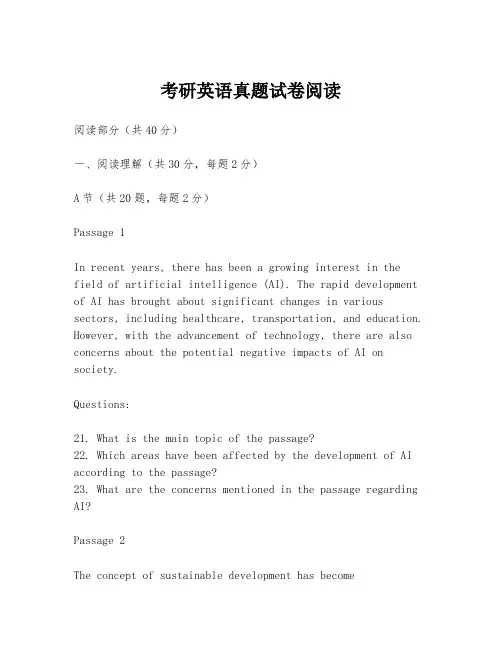
考研英语真题试卷阅读阅读部分(共40分)一、阅读理解(共30分,每题2分)A节(共20题,每题2分)Passage 1In recent years, there has been a growing interest in the field of artificial intelligence (AI). The rapid development of AI has brought about significant changes in various sectors, including healthcare, transportation, and education. However, with the advancement of technology, there are also concerns about the potential negative impacts of AI on society.Questions:21. What is the main topic of the passage?22. Which areas have been affected by the development of AI according to the passage?23. What are the concerns mentioned in the passage regarding AI?Passage 2The concept of sustainable development has becomeincreasingly important in today's world. It emphasizes the need to balance economic growth with environmental protection and social equity. Many countries have adopted policies and practices that promote sustainable development, aiming to create a better future for all.Questions:24. What does the passage mainly discuss?25. What does sustainable development focus on?26. What are the goals of sustainable development policies?Passage 3Cultural diversity is a rich source of creativity and innovation. It is essential to respect and value the unique cultural heritage of different communities. Promotingcultural diversity can lead to a more inclusive and harmonious society.Questions:27. What is the main idea of the passage?28. Why is cultural diversity important?29. What can be the result of promoting cultural diversity?B节(共10题,每题2分)Passage 4The rise of social media has transformed the way people communicate and interact with each other. It has also created new opportunities for businesses to reach out to theircustomers. However, the use of social media has raisedprivacy concerns and the spread of misinformation.Questions:30. What is the focus of the passage?31. How has social media changed communication?32. What issues are associated with the use of social media?二、新题型(共10分)Task 1: Information MatchingRead the following statements and match them with the corresponding passages from the previous section. Each statement can only be used once.33. The passage that discusses the impact of AI on employment.34. The passage that talks about the importance of environmental protection.35. The passage that highlights the benefits of cultural exchange.Task 2: SummaryWrite a brief summary of the main points discussed in the reading passages. Your summary should be no more than 100 words.注意:以上内容仅为示例,实际考研英语真题试卷的阅读部分会根据考试大纲和命题要求有所不同。

高考语文阅读真题及答案解析高考语文阅读真题及答案解析一、现代文阅读(9分,每小题3分)阅读下面的文字,完成1~3题。
文学中有历史。
当今历史学家大都认为,没有什么文献资料不是史料,不但文学作品,即如佛经、道藏、信札、家谱、账本、碑铭等也无一不是,而且随着史学研究领域的拓展,史料范围还在不断扩大。
从“三言二拍”里可以看到晚明市井生活的真实面貌,这对于研究社会史的人几乎是一个常识。
陈寅恪以诗证史,也为大家所熟悉。
但在“五四”以前,史料范围并非如此宽泛,文学作品在大多数史学家眼里也并非史料,有些文献到底属于文学还是史学,一两千年来都没有一致的看法。
神话传说就是如此,其中相当突出的例子是《山海经》。
神话传说是文学,史前时代,无文字可征,只有传说,暂当历史。
三皇五帝至今未曾坐实,但“炎皇子孙”已经成为口头语,甚至成为历史共识。
新的传说还会不断产生,能否成史颇为可疑,但以神话传说研究历史,却是一种重要的方法。
在历史上,《山海经》究竟应归于文学还是史学,曾是死结。
王国维《古史新证》说“而疑古之过,乃并尧、舜、禹之人物而变疑之,其于怀疑之态度及批评之精神不无可取,然惜于在于史材料未尝为充分之处理也。
”这些古史材料就包括《山海经》《穆天子传》等文献。
在《汉书〃艺文志》里,《山海经》列于数术类。
此后该书在目录学里的角色转换过几次,《隋书〃经籍志》将《山海经》列于史部地理类,也就是将它看成史书了。
历史是讲真实的,《山海经》一般被视为荒诞不经,连司马迁写《史记》都不敢采用。
虽然《山海经》里平实的山川地理内容应归于史部,但其中大量的神话故事却显然有悖信史,所以清人编《四库全书》,言其“侈谈神怪,百无一真,是直小说之祖耳”,将其改列于子部小说家类。
这个死结直到“五四”以后才大致解开。
解开的途径有二:一是将《山海经》分而治之,不把它看作一部成于一人一时之书,神话归神话,历史归历史;二是神话中也有历史的成分在,仍可以之证史或补史。
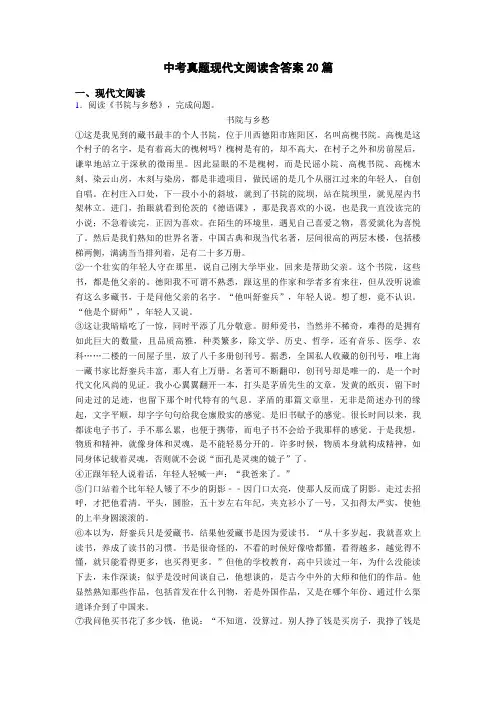
中考真题现代文阅读含答案20篇一、现代文阅读1.阅读《书院与乡愁》,完成问题。
书院与乡愁①这是我见到的藏书最丰的个人书院,位于川西德阳市旌阳区,名叫高槐书院。
高槐是这个村子的名字,是有着高大的槐树吗?槐树是有的,却不高大,在村子之外和房前屋后,谦卑地站立于深秋的微雨里。
因此显眼的不是槐树,而是民谣小院、高槐书院、高槐木刻、染云山房,木刻与染房,都是非遗项目,做民谣的是几个从丽江过来的年轻人,自创自唱。
在村庄入口处,下一段小小的斜坡,就到了书院的院坝,站在院坝里,就见屋内书架林立。
进门,抬眼就看到伦茨的《德语课》,那是我喜欢的小说,也是我一直没读完的小说;不急着读完,正因为喜欢。
在陌生的环境里,遇见自己喜爱之物,喜爱就化为喜悦了。
然后是我们熟知的世界名著,中国古典和现当代名著,层间很高的两层木楼,包括楼梯两侧,满满当当排列着,足有二十多万册。
②一个壮实的年轻人守在那里,说自己刚大学毕业,回来是帮助父亲。
这个书院,这些书,都是他父亲的。
德阳我不可谓不熟悉,跟这里的作家和学者多有来往,但从没听说谁有这么多藏书,于是问他父亲的名字。
“他叫舒銮兵”,年轻人说。
想了想,竟不认识。
“他是个厨师”,年轻人又说。
③这让我暗暗吃了一惊,同时平添了几分敬意。
厨师爱书,当然并不稀奇,难得的是拥有如此巨大的数量,且品质高雅,种类繁多,除文学、历史、哲学,还有音乐、医学、农科……二楼的一间屋子里,放了八千多册创刊号。
据悉,全国私人收藏的创刊号,唯上海一藏书家比舒銮兵丰富,那人有上万册。
名著可不断翻印,创刊号却是唯一的,是一个时代文化风尚的见证。
我小心翼翼翻开一本,打头是茅盾先生的文章,发黄的纸页,留下时间走过的足迹,也留下那个时代特有的气息。
茅盾的那篇文章里,无非是简述办刊的缘起,文字平顺,却字字句句给我仓廪殷实的感觉。
是旧书赋予的感觉。
很长时间以来,我都读电子书了,手不那么累,也便于携带,而电子书不会给予我那样的感觉。
于是我想,物质和精神,就像身体和灵魂,是不能轻易分开的。
语文八年级阅读理解真题在语文八年级的学习过程中,阅读理解是提高学生语言理解能力和文化素养的重要环节。
以下是一篇阅读理解真题,旨在帮助学生通过具体的文本分析,锻炼和提升阅读理解能力。
题目:阅读下面的文章,完成1-5题。
文章:在遥远的古代,有一个美丽的小村庄,那里的人们过着简单而和谐的生活。
村庄的四周被郁郁葱葱的森林所环绕,一条清澈的小溪穿村而过,溪水潺潺,仿佛在诉说着古老的故事。
村民们日出而作,日落而息,他们种植庄稼,养殖家禽,自给自足,生活得非常幸福。
然而,好景不长,一场突如其来的灾难降临了这个小村庄。
一场大火无情地吞噬了村庄的大部分房屋,许多村民失去了家园。
面对这样的灾难,村民们并没有放弃,他们互相帮助,共同重建家园。
在重建的过程中,他们发现了一个古老的秘密——在村庄的地下,隐藏着一个巨大的宝藏。
这个宝藏是由古代的智者留下的,里面装满了金银财宝和珍贵的文物。
村民们意识到,这些宝藏不仅仅是财富的象征,更是他们祖先智慧和勤劳的结晶。
于是,他们决定将宝藏用于村庄的发展,而不是私分。
他们用宝藏建立了学校,提高了教育水平;修建了医院,改善了医疗条件;还发展了农业和手工业,使得村庄的经济得到了快速的发展。
几年后,这个小村庄变成了一个繁荣的小镇,人们的生活水平大大提高。
他们感激祖先留下的宝藏,更加珍惜现在的生活。
他们知道,真正的宝藏不是金银财宝,而是团结、智慧和勤劳的精神。
1. 文章中提到的小村庄最初的生活方式是怎样的?A. 村民们过着奢侈的生活。
B. 村民们过着简单而和谐的生活。
C. 村民们依赖外界的援助。
D. 村民们生活贫困。
2. 村庄遭受的灾难是什么?A. 洪水B. 地震C. 大火D. 瘟疫3. 村民们在重建家园时发现了什么?A. 一个古老的传说B. 一个巨大的宝藏C. 一片肥沃的土地D. 一个神秘的山洞4. 村民们是如何使用宝藏的?A. 私分宝藏B. 用于个人消费C. 用于村庄的发展D. 用于建造豪华的宫殿5. 文章最后提到的“真正的宝藏”是什么?A. 金银财宝B. 团结、智慧和勤劳的精神C. 古代的文物D. 祖先的智慧参考答案:1. B2. C3. B4. C5. B通过这篇文章,学生不仅能够练习阅读理解的基本技巧,如理解文章主旨、抓取关键信息、分析文章结构等,还能够从中学习到团结、智慧和勤劳的重要性,以及如何正确地对待和使用财富。
考研英语历年阅读真题及答案考研英语阅读部分是考研考试中的重要组成部分,它旨在考查考生的英语阅读能力和理解能力。
在备考阶段,了解历年真题及其答案是非常重要的,它不仅可以帮助考生熟悉考试内容和出题方式,还可以帮助考生提高答题技巧和解题速度。
下面将为大家整理一些历年考研英语阅读真题及答案,希望对大家备考有所帮助。
【真题一】文本:(节选自2019年考研英语一真题)Protein is just one of many toxic substances that animals evolved to eat. In fact, some of the hardest foods to eat are some of the most nourishing and could be the most important ones in our diet. More than one billion people, mostly in the tropics, rely on cassava, a starchy root that has to be processed correctly to remove cyanide, which is present in its flesh. A root with the wrong texture or taste contains enough poison to cause a debilitating condition called konzo. To their cost, thousands of the very people most dependent on cassava can afford neither pots to cook it in nor firewood.1. According to the passage, konzo is caused byA) overconsumption of cassavaB) insufficient nutrients in the dietC) improper processing of cassavaD) lack of firewood for cooking答案:C) improper processing of cassava【真题二】文本:(节选自2018年考研英语一真题)Certainly, there is no shortage of individual exceptions to the rule, but on the whole, a rising tide of academic research over the last 30 years reports an significant increase in the diversity and complexity of the tasks that people now accomplish in the workplace. Routine analytic tasks requiring repetitive, rule-based work have declined substantially in employment overall.2. According to the passage, what has happened to the number of routine analytic tasks in the workplace?A) They have stayed the same.B) They have increased significantly.C) They have decreased substantially.D) They have become more complex.答案:C) They have decreased substantially.【真题三】文本:(节选自2017年考研英语二真题)Some people’s biometrics change with age, and these systems may ha ve difficulty identifying them over time. For example, studies have shown that facial recognition algorithms are not as accurate at identifying older adults.A study in 2010 found that error rates escalated between the ages of 45 and64.3. According to the passage, what is one limitation of facial recognition algorithms?A) They are inaccurate for older adults.B) They cannot distinguish biometric changes.C) They do not work on people under 45.D) They are not commonly used in studies.答案:A) They are inaccurate for older adults.【真题四】文本:(节选自2016年考研英语二真题)A new study suggests that humans are more prone to overeat in the evening due to the higher calorie content and larger portion sizes typically consumed. The study also found that perceived hunger levels, following a standardized meal, were lower in the morning than in the evening prior to eating the same meal.4. According to the passage, why are humans more likely to overeat in the evening?A) The portion sizes are larger.B) The hunger levels are higher.C) The calorie content is higher.D) The study did not explain the reason.答案:C) The calorie content is higher.以上是几道历年考研英语阅读真题及答案的节选,希望能够帮助考生们更好地备考考研英语阅读部分。
高考英语阅读理解真题汇编(含答案)一、高中英语阅读理解1.阅读理解Mexico sites on an island plateau (高原) surrounded by volcanic peaks, which makes air quality a constant concern for people who live there.In April, the country took a decisive step toward improving air quality by enacting a temporary ban on private and Federal vehicles in the city. The rule forbids people from driving in the city one day each week and one Saturday each month. Electric vehicles, government service vehicles, public transport options and school buses are not included in the ban.Mexico City isn't the first urban center to be involved in car-free living. But the ban is more than an awareness-raiser. It was enacted with the direct aim of solving air pollution. In March, the city sank into a deep brown haze of smog when the pollution levels passed the 200 mark. The city ordered some 1.1m of the area's 4.7m cars off the streets and also offered free bus and subway rides.Mexico City's temporary vehicle ban raises questions about the best ways to improve urban air quality. India, whose citizens breathe some of the world's dirtiest air, has tried a variety of solutions. Earlier this year, the Indian government started a 4% sales tax on new-car purchases. Beijing also has experience with cleaning the air. The city introduced alternate-day rules in advance of the 2008 Olympic Games, which produced good results. And then there is the London congestion (拥挤) charge, introduced in 2003. The charge has had a measurable effect on air quality.For now, Mexico City — named by the United Nations as the most polluted city on the planet in 1992 — can look forward to the start of the region's rainy season, when daily showers will help lo clean the air.(1)How did Mexico ban vehicles in the city?A. By banning private and Federal vehicles one day a week.B. By forbidding private and public vehicles every Saturday.C. By limiting the number of new cars.D. By prohibiting the vehicles except public ones.(2)What did the government of Mexico do when carrying out the ban on vehicles?A. Raised the number of public vehicles.B. Offered free bus and subway rides.C. Introduced more travel options.D. Encouraged citizens to leave the city.(3)What may contribute to improving the air quality in Mexico?A. Alternate-day rules.B. Tax rises.C. Congestion charge.D. The rainy season.(4)What's the best title for the passage?A. Mexico —an Island PlateauB. A Variety of Bans on Vehicles in MexicoC. Should Cities Be Car-free ZonesD. How to Improve Air Quality【答案】(1)A(2)B(3)D(4)C【解析】【分析】本文是一篇说明文,墨西哥墨西哥政府为了提高空气质量,在实施车辆禁令时提供免费巴士和地铁。
中考真题现代文阅读含答案20篇一、现代文阅读1.阅读文章,回答问题。
焰火的变奏赵丽宏夜晚,没有风,湖水平静得像一面巨大的镜子,映照着夜空;在水天相接处,夜空和湖泊构成一个轴对称的浩瀚画面。
湖畔积聚着数不清的人。
音乐响起,仿佛是从湖水里飘旋而出,在空旷的湖面回荡。
紧随着音乐,湖天之间突然蹿出一道道光点,犹如活泼的蝌蚪,从湖水深处向深邃的夜空腾游;也像犀利的鸣镝,从空中呼啸着飞入湖底。
只不过瞬间的工夫,这些蝌蚪和鸣镝便轰然炸裂,变成一朵朵巨大的彩色花朵,它们随风飘动变幻,继续着火焰在夜空里演出的奇妙童话。
而天上发生的所有一切,无一遗漏,都同时倒映在湖里……如果你的想象力不贫乏,那么,在这些千变万化的焰火里,可以联想起大地上所有的奇花异卉,可以联想起一年四季中大自然的美妙风景;当然也会联想起和焰火有关的往事,回忆起和焰火有关的一些难忘瞬间。
天上的烟花像什么?在听到有人这样发问时,除了那些美好的回忆,我的脑海中竟出现了一些和此时气氛毫不相干的景象。
那是战争中的夜景:弹和炮弹在夜空中划出耀眼的弧线,随之而来的,是爆炸,是火光,是惊悸的呼喊和痛苦的呻吟。
从战争年代走过来的人,都有这类恐怖的记忆:飞机在天空中隆隆飞过,炸弹从天而降,如飞蝗,如黑鹅,成群成片,大地摇撼,火光四起,城市仿佛在地震中颤抖。
“地震”之后,空中依然白云蓝天,但人间已是惨象遍地:火焰里血肉横飞,到处可以看到死者的鲜血和肢体,连树枝和电线上也挂着血淋淋的生命碎片……更凄惨的是失去亲人的哀痛景象:在被炸毁的火车站的站台上,一个未谙世事的孩子,坐在死去的母亲身边,惊惶无措地放声大哭;那个孩子的身边,也是烟和火……这样的噩梦,和眼下舒展在湖天之间的美妙焰火,没有任何关系。
然而,我却无法驱散火光中生发的遥远苦痛的联想。
炮火与焰火,都是火药爆炸产生的光芒,两者的目的和效果却是天差地别。
炮火,是为进攻,为征服,为反抗,为破坏,为杀戮,是人间最可怕最惨烈的景象,是战争、灾难和死亡的象征;焰火,是为庆祝,为团圆,为展示和平的欢乐,为表现人间的繁华和喜悦。
中考语文阅读理解真题附答案详解一、阅读理解训练题1.(2020无锡)阅读下文,回答问题。
夜行薛培政①“那天夜里的月亮啊,白亮白亮的,就像被水洗过一样……”九十多岁的凤山爷,说起1941年白露前夜的月亮,依然啧啧称奇。
②1938年的秋天,为了抗日,八路军来到了鲁中南地区,我就担任了地下交通员。
③那天刚擦黑,镇上开羊肉馆的刘大眼来了,他是我的上线。
一看他眨着那双忽闪忽闪的大眼,我就知道,有任务了。
他摸出一张二指宽的纸条,交代我,务必在天亮前送到部队首长手中。
我抽了袋烟,琢磨一下行程,向婆娘交代几句,就出发了。
④按说六十多里路,天亮前赶到不算啥,但自从鬼子来了之后,就在路上修了很多据点,国民党的部队也陆续进驻城西和南边的山区。
方圆几十里的地盘上,日军、伪军、国民党、土匪盘根错节,敌我难辨。
要将情报安全送到,就难了。
⑤出村后,大路不敢走,便疾步钻进了村南的野猫沟。
⑥月亮升起来了,像一个顶大的玉盘,把沟里照得如同白昼,一草一木看得真切,这对夜行极为不利。
为了隐蔽,我顺手拔草编了个草帽戴在头上,悄悄前行。
还好,一路上,除了几声狼嚎,也还顺利。
⑦从沟里出来,要过一个三岔路口,这是进山的必经之路,也是各路武装经常出没的地方。
我躲在庄稼地里仔细观察,见没有动静,就想快速通过﹣﹣没走几步,忽然看到西边路上有个人影一晃,我惊得头皮一麻。
⑧站在明处的我,躲是躲不过去了。
定了定神,小声朝那边喊道:“兄弟,都是过路人,出来吧!”⑨不一会儿,那人站到我面前,庄稼人打扮。
对方先开口了:“这位大哥,半夜三更,要去哪儿啊?”⑩“唉,老娘病了,要去水泉村抓药哩!”我看了对方一眼,“这位兄弟是﹣﹣”⑪“俺是沟北刘家坡的,驴跑了,出来找驴哩。
您从东边来,有没有看见大灰驴啊?”⑫“没有啊,要不您再找找?”我想尽快甩掉对方,离开此地。
⑬“哦,那我再往前找找。
”说罢,便朝南边那条小路上走去。
我心里咯噔一下,这也是我要走的路啊,怎么办?改道已经来不及了:“正好,我也走这边,咱俩就做个伴吧!”⑭“那好,大哥请!”望见他不经意的一个手势,我就对他不敢小觑了。
六年级语文阅读理解真题80篇在六年级的语文学习中,阅读理解是极为重要的一个环节。
它不仅能够提升学生的语文素养,还能锻炼学生的逻辑思维和语言表达能力。
以下是80篇精选的六年级语文阅读理解真题,旨在帮助学生更好地掌握阅读理解的技巧和方法。
1. 春天的早晨春天的早晨,阳光透过窗帘,轻轻地洒在了窗台上。
小鸟在窗外欢快地唱着歌,仿佛在告诉人们春天的到来。
孩子们穿上了新衣服,背着书包,兴高采烈地去上学。
大人们也开始了一天的忙碌,街道上充满了生机和活力。
2. 秋天的田野秋天的田野里,金黄的稻谷随风摇曳,仿佛在向人们展示着丰收的喜悦。
农民伯伯们忙碌着收割,脸上洋溢着满足的笑容。
孩子们在田野里追逐嬉戏,享受着大自然的馈赠。
3. 夜晚的星空夜晚的星空,繁星点点,如同无数颗璀璨的宝石镶嵌在黑色的天幕上。
月亮静静地悬挂在天际,洒下柔和的银光。
人们仰望星空,心中充满了对宇宙的好奇和向往。
4. 冬日的雪景冬日的雪景,银装素裹,一片洁白。
雪花纷纷扬扬地飘落,给大地披上了一层厚厚的白纱。
孩子们在雪地里堆雪人、打雪仗,欢声笑语在寒冷的空气中回荡。
5. 家乡的小河家乡的小河,清澈见底,河水潺潺流淌。
河边的柳树随风摇曳,倒映在水面上,形成了一幅美丽的画面。
孩子们在河边捉小鱼、捉螃蟹,享受着童年的乐趣。
6. 校园的早晨校园的早晨,阳光明媚,空气清新。
学生们在操场上做早操,整齐的动作,响亮的口号,展现出青春的活力。
教室里,老师和学生们开始了一天的学习,书声琅琅,充满了求知的热情。
7. 书店的一角书店的一角,书架上摆满了各种各样的书籍。
孩子们在书架间穿梭,挑选着自己喜爱的书籍。
他们或坐或站,沉浸在书的世界里,享受着阅读的乐趣。
8. 公园的傍晚公园的傍晚,夕阳西下,晚霞映照在湖面上,波光粼粼。
老人们在湖边散步,享受着悠闲的时光。
孩子们在公园里玩耍,笑声和欢呼声此起彼伏。
9. 雨后的彩虹雨后的彩虹,横跨天际,色彩斑斓,如同一座美丽的桥梁。
孩子们兴奋地指着彩虹,讨论着它的颜色和形状。
Questions 26 to 35 are based on the following passage.The method for making beer has changed over time. Hops (啤酒花), for example, which give many a modem beer its bitter flavor, are a __26__ recent addition to the beverage. This was first mentioned in reference to brewing in the ninth century. Now, researchers have found a __27__ ingredient in residue (残留物)from 5000-year-old beer brewing equipment. While digging two pits at a site in the central plains of China, scientists discovered fragments from pots and vessels. The different shapes of the containers __28__ they were used to brew, filter, and store beer. They may be ancient “beer-making tools”,and the earliest __29__ evidence of beer brewing in China, the researchers reported in the Proceedings of the National Academy of Sciences. To __30__ that theory, the team examined the yellowish, dried __31__ inside the vessels. The majority of the grains, about 80%, were from cereal crops like barley (大麦)and about 10% were bits of roots __32__ lily, which would have made the beer sweeter, the scientists say. Barley was an unexpected find: the crop was domesticated in Western Eurasia and didn’t become a __33__ food in central China until about 2,000 years ago, according to the researchers. Based on that timing, they indicate barley may have __34__ in the region not as food, but as __35__ material for beer brewing.A)arrivedB)consumingC)directD)exclusivelyE)includingF)informG)rawH)reachedI)relatively J)remains K)resources L)stapleM)surprising N)Suggest O)TestSection BDirections: In this section, you are going to read a passage with ten statements attached to it. Each statement contains information given in one of the paragraphs. Identify the paragraph from which the information is derived. You may choose a paragraph more than once. Each paragraph is marked with a letter. Answer the question by marking the corresponding letter on Answer Sheet 2.The Blessing and Curse of the People Who Never ForgetA handful of people can recall almost every day of their lives in enormous detail-and after years of research, neuroscientists are finally beginning to understand how they do it.[A] For most of us, memory is a mess of blurred and faded pictures of our lives. As much as we would like to cling on to our past, even the saddest moments can be washed away with time.[B] Ask Nima Veiseh what he was doing for any day in the past 15 years, however, and he will give you the details of the weather, what he waswearing, or even what side of the train he was sitting on his journey to work. “My memory is like 汪library of video tapes, walk-throughs of every day of my life from waking to sleeping,”he explains.[C] Veiseh can even put a date on when those tapes started recording: 15 December 2000, when he met his first girlfriend at his best friend’s 16th birthday party. He had always had a good memory, but the thrill of young love seems to have shifted a gear in his mind: from now on, he would start recording his whole life in detail. “I could tell you everything about every day after that.”[D] Needless to say, people like Veiseh are of great interest to neuroscientists (神经科学专家)hoping to understand the way the brain records our lives. A couple of recent papers have finally opened a window on these people’s extraordinary minds. And such research might even suggest ways for us all to relive our past with greater clarity.[E] “Highly superior autobiographical memory”(or HSAM for short), first came to light in the early 2000s, with a young woman named Jill Price. Emailing the neuroscientist and memory researcher Jim McGaugh one day, she claimed that she could recall every day of her life since the age of 12. Could he help explain her experiences?[F] McGaugh invited her to his lab, and began to test her: he would give her a date and ask her to tell him about the world events on that day. True to her word, she was correct almost every time.[G] It didn’t take long for magazines and documentary film-makers to come to understand her “total recall”, and thanks to the subsequent media interest, a few dozen other subjects (including Veiseh) have since come forward and contacted the team at the University of California, Irvine.[H] Interestingly, their memories are highly self-centred: although they can remember “autobiographical”life events in extraordinary detail, they seem to be no better than average at recalling impersonal information, such as random (任意选取的)lists of words. Nor are they necessarily better at remembering a round of drinks, say. And although their memories are vast, they are still likely to suffer from “false memories' Clearly, there is no such thing as a “perfect”memory~~their extraordinary minds are still using the same flawed tools that the rest of us rely on. The question is, how?[I] Lawrence Patihis at the University of Southern Mississippi recentlystudied around 20 people with HSAM and found that they scored particularly high on two measures: fantasy proneness (倾向)and absorption. Fantasy proneness could be considered a tendency to imagine and daydream, whereas absorption is the tendency to allow your mind to become fully absorbed in an activity to pay complete attention to the sensations (感受)and the experiences. “I’m extremely sensitive to sounds, smells and visual detail,”explains Nicole Donohue, who has taken part in many of these studies. “I definitely feel things more strongly than the average person.”[J] The absorption helps them to establish strong foundations for recollection, says Patihis, and the fantasy proneness means that they revisit those memories again and again in the coming weeks and months. Each time this initial memory trace is “replayed”,it becomes even stronger. In some ways, you probably go through that process after a big event like your wedding day but the difference is that thanks to their other psychological tendencies, the HSAM subjects are doing it day in, day out, for the whole of their lives.[K] Not everyone with a tendency to fantasise will develop HSAM, though, so Patihis suggests that something must have caused them to think so much about their past. “Maybe some experience in theirchildhood meant that they became obsessed (着迷)with calendars and what happened to them,”says Patihis.[L] The people with HSAM Fve interviewed would certainly agree that it can be a mixed blessing. On the plus side, it allows you to relive the most transformative and enriching experiences. Veiseh, for instance, travelled a lot in his youth. In his spare time, he visited the local art galleries, and the paintings are now lodged deep in his autobiographical memories.[M] “Imagine being able to remember every painting, on every wall, in every gallery space, between nearly 40 countries,”he says. “That’s a big education in art by itself.”With this comprehensive knowledge of the history of art, he has since become a professional painter.[N] Donohue, now a history teacher, agrees that it helped during certain parts of her education: “I can definitely remember what I learned on certain days at school. I could imagine what the teacher was saying or what it looked like in the book.”[O] Not everyone with HSAM has experienced these benefits, however. Viewing the past in high definition can make it very difficult to get over pain and regret. “It can be very hard to forget embarrassing moments,”says Donohue. “You feel the same emotions—it is just as raw, just as fresh…ou can’t turn off that stream of memories, no matter how hard you try.”Veiseh agrees: “It is like having these open wounds they are just a part of you,”he says.[P]This means they often have to make a special effort to lay the past to rest. Bill, for instance, often gets painful “flashbacks”, in which unwanted memories intrude into his consciousness, but overall he has chosen to see it as the best way of avoiding repeating the same mistakes. “Some people are absorbed in the past but not open to new memories, but that’s not the case for me. I look forward to each day and experiencing something new.”36.People with HSAM have the same memory as ordinary people when it comes to impersonal information.37.Fantasy proneness will not necessarily cause people to develop HSAM.38.Veiseh began to remember the details of his everyday experiences after he met his first young love.39. Many more people with HSAM started to contact researchers due to the mass media.40. People with HSAM often have to make efforts to avoidfocusing on the past.41. Most people do not have clear memories of past events.42. HSAM can be both a curse and a blessing.43. A young woman sought explanation from a brain scientist when she noticed her unusual memory.44. Some people with HSAM find it very hard to get rid of unpleasant memories.45. A recent study of people with HSAM reveals that they are liable to fantasy and full absorption in an activity.Section CDirections: There are 2 passages in this section. Each passage is followed by some questions or unfinished statements. For each of them there are four choices marked A), B), C) and D). You should decide on the best choice and mark the corresponding letter on Answer Sheet 2 with a single line through the centre.Passage OneQuestions 46 to 50 are based on the following passage.The phrase almost completes itself: midlife crisis. It’s the stage in the middle of the journey when people feel youth vanishing, their prospects narrowing and death approaching.There’s only one problem with the cliche (套话). It isn’t true.“In fact, there is almost no hard evidence for midlife crisis other than a few small pilot studies conducted decades ago,”Barbara Hagerty writes in her new book, Life Reimagined. The bulk of the research shows that there may be a pause, or a shifting of gears in the 40s or 50s, but this shift “can be exciting, rather than terrifying.”Barbara Hagerty looks at some of the features of people who turn midlife into a rebirth. They break routines, because “autopilot is death.” They choose purpose over happiness —having a clear sense of purpose even reduces the risk of Alzheimer’s disease. They give priority to relationships, as careers often recede (逐渐淡化).Life Reimagined paints a picture of middle age that is far from gloomy. Midlife seems like the second big phase of decision-making. Your identity has been formed; you’ve built up your resources; and now you have the chance to take the big risks precisely because your foundation is already secure.Karl Barth described midlife precisely this way. At middle age, he wrote, “the sowing is behind; now is the time to reap. The run has been taken; now is the time to leap. Preparation has been made; now is the time for the venture of the work itself.”The middle-aged person, Barth continued, can see death in the distance, but moves with a “measured haste” to get big new things done while there is still time.What Barth wrote decades ago is even truer today. People are healthy and energetic longer. We have presidential candidates running for their first term in office at age 68, 69 and 74.A longer lifespan is changing the narrative structure of life itself. What could have been considered the beginning of a decent is now a potential turning point the turning point you are most equipped to take full advantage of.46. What does the author think of the phrase “midlife crisis”?A) It has led to a lot of debate.B) It is widely acknowledged.C) It is no longer fashionable.D) It misrepresents real life.【答案】D【解析】本题定位在第二段。